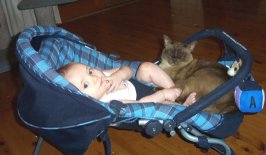http://www.cat-world.com.au/cat-worldbaby.htm
Overview:
Many untruths surround cats & newborn babies. Shelters are often asked to take in the family cat because a new baby has arrived & the parents worry about the risk the cat poses to the child. Most shelters are desperately overworked & under funded. It is far better for all concerned that future parents educate themselves on this matter.

During my recent pregnancy it was suggested by several well meaning (but uneducated) people that with a baby on the way we would have to get rid of the cats. People still believe the old wives tales about babies being smothered by cats. From research I did on the internet I found out that this is in fact totally untrue. There are cases of parents accidentally smothering their baby, but there are no reported cases of cats doing this (either on purpose or by accident). What has been suggested is that some babies die of SIDS & it so happens that the cat is found in the crib with the dead child. This is merely a coincidence. The cat was NOT the cause of the child's death.
However, it is wise to take some precautions. You can purchase a net to put over the crib so the cat can't sleep with the baby. Another good suggestion is to replace the door to the baby's nursery with a screen door. This enables the cat to see & smell the baby & not feel entirely left out, but it can't get into the bedroom.
Another urban legend is that cat's suck the baby's breath. Again, untrue. If a cat is found close to the baby's head it's more likely due to the cat seeking some warmth. If the above suggestions are followed, this won't happen.
Make sure litter trays & food bowls are kept in an area the baby can't access, this is especially important when the child starts crawling. A safety gate is recommended to prevent your child getting close to the litter tray.
Ensure your cat is regularly de-flead & de-wormed. Make sure the products you use on your cat are safe to use around the baby. If you are worried about your cat scratching your baby, (which is highly unlikely), you can either regularly trim your cat's claws (see trimming cat's claws), or use Soft Paws, which are plastic caps you glue over your cat's claws.

They are also a much kinder alternative to declawing.
Personally, I was more concerned about what my child might do to a cat. Certainly with the majority of my cats I believe they would be scared of a baby and all the sounds that come from them. They have little interaction with small children, choosing to vacate the premises when a child is visiting. It is unfair to offload what was once a family pet & valued member of the family just because a baby is on the way. In my opinion pets can offer children so much. I wouldn't encourage a young child to pick up a cat. Teach the child what is acceptable behaviour, for example how to gently pet the cat. Ears, eyes, whiskers & the tail should not be pulled. Teach your child that the cat is a member of the family who has feelings too, and it should be treated with kindness & respect.
Cats harbour disease
Well yes, cats sometimes do harbour disease but there are very few diseases of the cat that are zoonotic (transmissible from cat to human). It is fairly rare to pick up a disease from a cat, personally I believe you (or your baby) are far more likely to catch a disease from a human than a cat. It is recommended that you take your cat to the vet for a thorough check up before your baby is born. Have the vet worm your cat & check it for Ringworm. Ensure you stick to a regular worming & de-fleaing regime. Keeping your cat indoors and away from roaming cats is your safest way to keep your cat disease & parasite free.
Toxoplasmosis is caused by a parasite called Toxoplasma Gondii. Many animals can get Toxoplasmosis including sheep, cattle & pigs. Cats shed the parasitic cysts in their faeces & which then infect humans & other animals.
In healthy adults, Toxoplasmosis usually causes only mild symptoms. If a woman becomes infected during her pregnancy it can have devastating affects on the unborn fetus. If you own a cat & are pregnant it is advisable to ask your doctor to do a blood test to see if you have antibodies to Toxoplasmosis, which would indicate a past exposure to the parasite. If you have been infected in the past, there is little to no risk of you passing it on to your unborn baby. If you haven't had prior exposure it is advisable to have your partner clean litter trays during your pregnancy. If this is not possible, use rubber gloves & try to avoid inhaling any dust from litter trays, it is advisable to wear a mask. It takes between 24-48 hours for the cysts to become infective, so daily cleaning of the litter tray will almost entirely eliminate the risk of infection. It is perfectly safe for pregnant women to co-exist with their family cat as long as these precautions are taken.
Humans can also become infected by handling (and eating) raw or undercooked meat & vegetables. Ensure your meat is thoroughly cooked & that you wash your hands & utensils after handling meat. There is a greater risk of you becoming infected with Toxoplasmosis from raw & undercooked meat than there is from your cat, if kept indoors.
Ringworm: This is caused by a fungi, not a worm. It is more a nuisance than a danger. It can sometimes be hard to eliminate from the environment, however with stringent cleaning & the use of anti-fungal creams it is can be cleared up. Again, if your cat is indoors and has had the all clear from your vet, there is little chance of you or your baby catching this.
Rabies: Rabies isn't a problem in Australia. Most (if not all) cats in countries with Rabies regularly vaccinate their cats, it is very rare for a cat to catch Rabies.
Cat Scratch Disease: This is caused by a bacteria called Bartonella henselae. This is rarely a problem in people with a healthy immune system, it is most often seen in immunocompromised people. Antibiotic treatment of you & your cat usually clears up this infection.
Salmonella: Caused by a bacteria of the Salmonella genus. This is most commonly acquired via oral ingestion. Cats are most likely to become infected after eating birds.
If you still have any doubts about raising a baby with a cat in the house I would recommend you speak to both your vet & your doctor who will be able to put your mind at ease.
During my pregnancy I spoke to several mothers who all assured me they had quite safely managed to raise cats & kids together & had no problems whatsoever. The people who warn you that cats & babies can't co-exist are always people who haven't actually researched this matter. They just repeat urban legends.
Introducing Your Baby To Your Cat:
Read here...
Important note:
This article was written to hopefully put new or soon to be parent's worries to rest & debunk a lot of incorrect information in the public domain in regards to cats, pregnancy & children. Cats & new babies can co-exist together quite happily but your child's safety has to be of utmost importance. NEVER leave a baby or young child alone with any pet, cat included.
Cats & humans have lived together for thousands of years but it is important to remember that they are still wild animals & their behaviour cannot be predicted with 100% accuracy. A cat should never be permitted into the same room a baby/young child is sleeping & proper safety precautions should be taken to ensure the cat doesn't have access to the baby's room.
If proper safety precautions are taken to ensure your cat & baby/young child are only together under adult supervision your cat & child will be able to quite happily cohabit together & hopefully once the child grows older will form a long & lasting bond.
